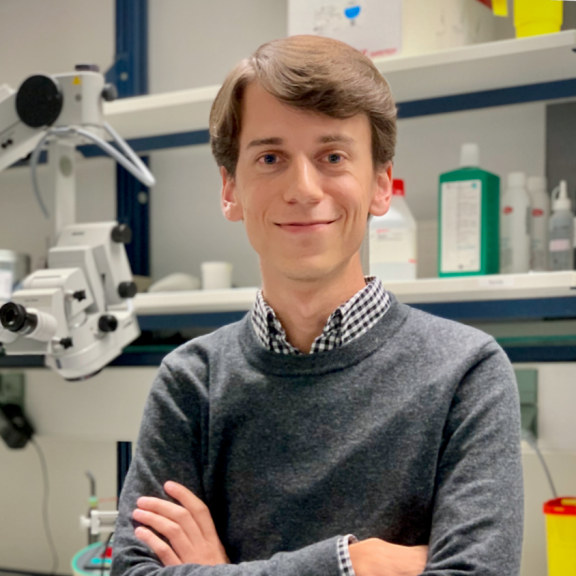Maxime Maheu Exploring neuro-computational learning mechanisms
Maxime Maheu, neuroscience researcher in the laboratories of Professors Tobias Donner and Simon Wiegert, Hamburg University Medical Center, Germany
- 2020 • Bettencourt Prize for Young Researchers

The 2020 Bettencourt Prize for Young Researchers was awarded to Maxime Maheu, post-doctoral fellow in neuroscience, for his work on neuro-computational learning mechanisms.
Neuro-computation: the algorithms of learning
Computational neuroscience combines experimentation with the simulation of mathematical models and algorithms to identify the principles underlying brain and cognitive functions.Maxime Maheu uses this approach to study learning mechanisms. He focuses on how the brain integrates the environment’s temporal rhythms, which are so diverse. How can we understand spoken language, recognize a Beethoven symphony from the first notes or forecast rain by observing clouds?During his post-doctoral research, he explores the neuro-computational mechanisms by which the brain iteratively updates its knowledge in response to new observations. He is particularly interested in the hypothesis that deep brain structures in the brainstem participate in this process by modulating the cerebral cortex.
Of mice and men: an illuminating comparison
To do this, Dr. Maheu uses a translational method combining mouse models and human participants in analogous learning situations. In mice, he records and manipulates the neuronal activity of deep brain structures; in humans, he records cortical activity on a macroscopic scale. His approach should help to reveal different facets of the learning process, which will be unified in a common theoretical framework through mathematical modeling.
His research could ultimately lead to a better understanding of how past events influence our perceptions and decisions, including when the influence is harmful and biases our decisions.
"It’s fascinating to analyze how our past perceptions and decisions influence our current knowledge and future decisions." Maxime Maheu
Maxime Maheu in a few words
Maxime Maheu is a neuroscientist. After studying psychology and obtaining a master's degree in cognitive science at the École Normale Supérieure de Paris, he specialized in brain imaging, experimental psychology and mathematical modeling to explore learning and decision-making processes.
As early as his doctorate under the supervision of Stanislas Dehaene and Florent Meyniel, he developed a computational approach to determine how past sensory events influence human behavior and brain activity. He has shown that the brain has several inference systems allowing it to learn environmental patterns. Some look for local patterns, others for global ones; some learn statistical trends while others look for set rules.
In the longer term, Dr. Maheu hopes to further his research at a neuroscience research institute that allows him to keep an interdisciplinary approach. He also hopes to be able to apply some of his findings to contribute to a better understanding of psychiatric disorders.
Bettencourt Prize for Young Researchers
Created in 1990, the Bettencourt Prize for Young Researchers is one of the first initiatives of the Fondation Bettencourt Schueller. Until 2021, this prize was awarded each year to 14 young doctors of science or doctors of medicine, to enable them to carry out their post-doctoral stay in the best foreign laboratories. 349 young researchers were distinguished. The prize endowment was €25,000.
All the award-winners